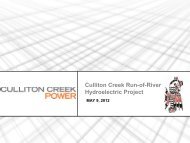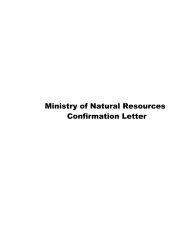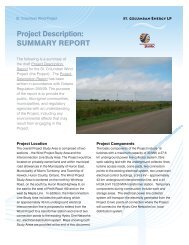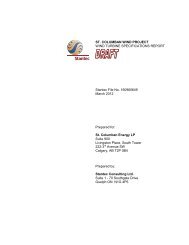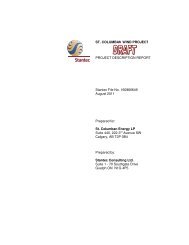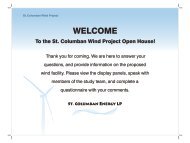Financial Report - Veresen Inc.
Financial Report - Veresen Inc.
Financial Report - Veresen Inc.
Create successful ePaper yourself
Turn your PDF publications into a flip-book with our unique Google optimized e-Paper software.
The level of commitments for transport on the Alliance pipeline after December 1, 2015 may be negatively impacted by the<br />
development of new sources of natural gas. In particular, shale gas deposits in the United States could provide an alternate source<br />
of natural gas to the Chicago hub, decreasing the U.S. northeast region’s reliance on natural gas imports from Canada, and<br />
correspondingly, decreasing commitments for transport on the Alliance pipeline.<br />
Demand for natural gas in the midwestern and northeastern United States depends, among other things, on weather, price and<br />
consumption, and alternative energy sources. Upon maturity of the existing transportation contracts, Alliance faces competition in<br />
pipeline transportation to Chicago area delivery points from both existing pipelines and proposed projects. Any new or upgraded<br />
pipelines could either allow shippers and competing pipelines to have greater access to natural gas markets served by Alliance and the<br />
pipelines to which it is connected or offer natural gas transportation services that are more desirable to shippers than those provided by<br />
Alliance due to location, facilities or other factors. In addition, competing pipelines could charge rates or provide transportation services<br />
to locations that result in greater net profit for shippers, which could result in reduced revenues and cash flows for Alliance.<br />
Two large petrochemical companies, each of whom own and operate world-class petrochemical facilities in Alberta, drive the demand<br />
for ethane shipped on AEGS. If, for any reason, either of these customers, or their successors, ceased to operate these facilities or<br />
otherwise reduced or eliminated the quantities of ethane purchased by them, this could have a negative effect on the quantity of ethane<br />
transported on AEGS and our earnings and cash flows.<br />
We can give no assurance as to the respective abilities of Alliance and AEGS to replace contact commitments from shippers<br />
or to negotiate terms similar to those under current transportation contracts upon their expiry in 2015 and 2018, respectively.<br />
Rate Regulation<br />
Alliance is subject to Canadian and United States federal regulation by the NEB and the FERC, respectively. AEGS is subject to Canadian<br />
provincial regulation by the Alberta Utilities Commission. The ability of our pipelines to generate earnings and cash flows could be<br />
adversely affected by changes in pipeline regulation, including:<br />
• changes in interpretations of existing regulations by courts or regulators;<br />
• the exclusion of any cost of service amounts;<br />
• any other adverse change to the rates on the respective rate structures or terms and conditions of service; and<br />
• in the case of Alliance, a reduction in the negotiated rate of return on equity.<br />
Recovery of Capital<br />
Alliance is permitted to recover from shippers costs incurred in the construction and operation of the pipeline system that are actually<br />
and reasonably incurred in accordance with NEB and FERC regulations. Alliance has firm transportation service agreements for 90.5%<br />
and 84.7% of its Canadian and U.S. capacity, respectively, until December 1, 2015, 2.3% and 2.1% until December 1, 2016, 1.5% and<br />
1.4% until October 31, 2013, and 5.7% of its U.S. capacity until February 1, 2020. Firm transportation agreements for the remaining<br />
capacity extend until December 1, 2018. Alliance is exposed to economic risk associated with the recovery of capital beyond the term<br />
of the transportation service agreements. There is no assurance that Alliance will be able to replace the transportation agreements<br />
with contracts, the terms of which would enable recovery of the remaining capital cost directly through tolls.<br />
Risk Specific to Alliance and Aux Sable<br />
Interdependency<br />
There is a significant degree of interdependency between Alliance and Aux Sable, which are related parties through common controlling<br />
ownership interests. On one hand, should Aux Sable fail to provide heat content management services to Alliance U.S. for any reason,<br />
the Alliance pipeline and its shippers may experience operational issues, including in certain circumstances an interruption or<br />
curtailment of transportation service on the Alliance pipeline. On the other hand, the volume and composition of inlet natural gas<br />
available to Aux Sable is dependent on the volumes transported on the Alliance pipeline, which is subject to supply and demand<br />
factors, including competitive pressures from other pipeline systems, and the operating performance of the Alliance pipeline.<br />
31



